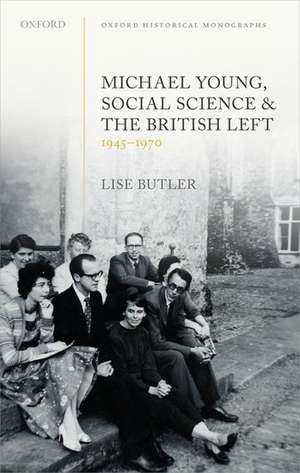Michael Young, Social Science, and the British Left, 1945-1970: Oxford Historical Monographs
Autor Lise Butleren Limba Engleză Hardback – 3 sep 2020
Din seria Oxford Historical Monographs
- 19%
 Preț: 497.26 lei
Preț: 497.26 lei - 12%
 Preț: 310.34 lei
Preț: 310.34 lei - 30%
 Preț: 539.99 lei
Preț: 539.99 lei - 15%
 Preț: 244.01 lei
Preț: 244.01 lei - 13%
 Preț: 532.53 lei
Preț: 532.53 lei - 30%
 Preț: 499.46 lei
Preț: 499.46 lei - 30%
 Preț: 497.67 lei
Preț: 497.67 lei - 30%
 Preț: 499.18 lei
Preț: 499.18 lei - 30%
 Preț: 498.68 lei
Preț: 498.68 lei - 30%
 Preț: 604.98 lei
Preț: 604.98 lei - 30%
 Preț: 497.63 lei
Preț: 497.63 lei - 24%
 Preț: 496.31 lei
Preț: 496.31 lei - 30%
 Preț: 498.68 lei
Preț: 498.68 lei - 25%
 Preț: 556.27 lei
Preț: 556.27 lei - 14%
 Preț: 539.57 lei
Preț: 539.57 lei - 30%
 Preț: 500.29 lei
Preț: 500.29 lei - 13%
 Preț: 533.57 lei
Preț: 533.57 lei - 25%
 Preț: 569.72 lei
Preț: 569.72 lei - 30%
 Preț: 610.82 lei
Preț: 610.82 lei - 34%
 Preț: 1153.34 lei
Preț: 1153.34 lei - 51%
 Preț: 614.88 lei
Preț: 614.88 lei - 34%
 Preț: 1195.31 lei
Preț: 1195.31 lei - 34%
 Preț: 1035.84 lei
Preț: 1035.84 lei - 34%
 Preț: 1006.40 lei
Preț: 1006.40 lei - 29%
 Preț: 864.39 lei
Preț: 864.39 lei - 34%
 Preț: 1160.09 lei
Preț: 1160.09 lei - 34%
 Preț: 1432.67 lei
Preț: 1432.67 lei - 31%
 Preț: 328.46 lei
Preț: 328.46 lei - 34%
 Preț: 574.40 lei
Preț: 574.40 lei - 34%
 Preț: 1067.93 lei
Preț: 1067.93 lei - 34%
 Preț: 1004.62 lei
Preț: 1004.62 lei - 31%
 Preț: 331.22 lei
Preț: 331.22 lei - 34%
 Preț: 1153.28 lei
Preț: 1153.28 lei - 34%
 Preț: 1254.66 lei
Preț: 1254.66 lei - 34%
 Preț: 946.79 lei
Preț: 946.79 lei - 34%
 Preț: 962.63 lei
Preț: 962.63 lei - 34%
 Preț: 1126.38 lei
Preț: 1126.38 lei - 31%
 Preț: 469.27 lei
Preț: 469.27 lei - 23%
 Preț: 332.04 lei
Preț: 332.04 lei - 28%
 Preț: 375.23 lei
Preț: 375.23 lei - 34%
 Preț: 1049.14 lei
Preț: 1049.14 lei - 34%
 Preț: 1036.73 lei
Preț: 1036.73 lei - 51%
 Preț: 757.67 lei
Preț: 757.67 lei - 34%
 Preț: 1082.61 lei
Preț: 1082.61 lei - 34%
 Preț: 1155.39 lei
Preț: 1155.39 lei - 31%
 Preț: 328.53 lei
Preț: 328.53 lei - 34%
 Preț: 1110.12 lei
Preț: 1110.12 lei - 31%
 Preț: 487.75 lei
Preț: 487.75 lei - 34%
 Preț: 1153.41 lei
Preț: 1153.41 lei
Preț: 497.81 lei
Preț vechi: 637.84 lei
-22% Nou
Puncte Express: 747
Preț estimativ în valută:
95.25€ • 99.45$ • 78.84£
95.25€ • 99.45$ • 78.84£
Carte disponibilă
Livrare economică 03-10 martie
Preluare comenzi: 021 569.72.76
Specificații
ISBN-13: 9780198862895
ISBN-10: 019886289X
Pagini: 278
Dimensiuni: 147 x 224 x 22 mm
Greutate: 0.49 kg
Editura: OUP OXFORD
Colecția OUP Oxford
Seria Oxford Historical Monographs
Locul publicării:Oxford, United Kingdom
ISBN-10: 019886289X
Pagini: 278
Dimensiuni: 147 x 224 x 22 mm
Greutate: 0.49 kg
Editura: OUP OXFORD
Colecția OUP Oxford
Seria Oxford Historical Monographs
Locul publicării:Oxford, United Kingdom
Recenzii
What a pleasure it is to read a book that is both a serious work of history and a primer for contemporary politics
Butler succeeds brilliantly at placing Young in his context to draw out both his effectiveness yet also the limits of his work... And, although Butler emphasises Young's influence within the political left, she also provides ample evidence of his ability to engage with conservative intellectuals at a time when a cross-party consensus about social welfare was considerable.
Butler's account provides, through the technicolour prism of Michael Young, a rich perspective on both social scientific and left-wing policy debates in post-war Britain. The result is a fascinating, deeply researched and revelatory book.
Butler succeeds brilliantly at placing Young in his context to draw out both his effectiveness yet also the limits of his work... And, although Butler emphasises Young's influence within the political left, she also provides ample evidence of his ability to engage with conservative intellectuals at a time when a cross-party consensus about social welfare was considerable.
Butler's account provides, through the technicolour prism of Michael Young, a rich perspective on both social scientific and left-wing policy debates in post-war Britain. The result is a fascinating, deeply researched and revelatory book.
Notă biografică
Lise Butler is a Lecturer in Modern History at City, University of London. She is a historian of modern Britain, interested in political history, left-wing politics, and the history of the social sciences. She completed her doctorate at University College Oxford, and has held a lectureship in History at Pembroke College Oxford and an Archives By-Fellowship at Churchill College Cambridge. She is originally from Victoria, British Columbia, Canada.
